#Khamaseen Winds
Text
두 개의 시, 자카리아 모하메드
Two Poems
By Zakaria Mohammed
Translated by Lena Tuffaha
I.
I caught a glimpse of you as I ran. I had no time to stop and kiss your hand. The world was chasing me down like I was a thief and it was impossible for me to stop. If I had stopped I’d have been killed. But I caught a glimpse of you: your hand a stem of narcissus in a glass of water, your mouth unbuttoned, and your hair a soaring bird of prey. I caught a glimpse of you but I had no matches with me to light a bonfire and dance around it. The world was failing me, abandoning me, so I didn’t even wave at you.
One day the world will settle down, the crazed cable channels will stop broadcasting, and those that hound me will disperse so I can return to that road, the one where I caught a glimpse of you. I’ll find you in that same chair: your hand a stem of narcissus, your smile a bird of prey, and your heart an apricot blossom. And there, with you, beneath the shade of your apricot, I’ll tear down the tent of my orphanhood and build my home.
—from Kushtban
II.
Night is a generous friend. All things loosen their vines over my head. My beloveds are seated around me as if we were at a celebration. My beloveds who have passed. My beloveds who are here, and beloveds yet to come. And death is a watchdog chained at the gate. Only the Khamaseen wind beats angrily at the door. Khamaseen is a loathsome neighbor; I raise a wall between us, turn out the lights between us.
I am happy, singing like a rod of ephedra, crying out like a raptor.
Do not believe my words. Don’t reach out to the vines in the darkness. Night is a pact of horrors. Ten birds sleep in the tree, but one anxiously circles over the house. And as you know, one bird suffices to destroy an entire celebration, one match to burn down a civilization.
The meal was cold. I rinsed my mouth out afterwards with Khamaseen, and washed my hands with lichen.
If there was any use in weeping I would have wept before you all. But weeping requires more energy than we possess, so I will sing for you like tender Saba wind, I’ll sing in the vernacular of a young basil stem: night is a stone of amber. Night is a pact of marvels.
—from Alanda (Ephedra)
_
두 개의 시
- 자카리아 모하메드
- 레나 투파하 아랍어에서 영어로 옮김
I.
달리며 당신을 얼핏 보았습니다. 멈춰 서서 당신 손에 입을 맞출 시간이 없었어요. 세상이 마치 내가 도둑이라는 듯이 나를 뒤쫓고 있었고 나는 도저히 멈출 수가 없었습니다. 멈췄더라면 나는 죽임을 당했을거예요. 하지만 얼핏 당신을 봤습니다: 당신의 손은 물잔에 담긴 한 줄기 수선화, 조금 벌린 당신의 입, 당신 머리카락은 솟아오르는 맹금. 얼핏 당신을 보았지만 내게는 춤을 추며 돌 모닥불을 피울 성냥이 없었습니다. 세상이 나를 실망시키고 있었고, 나를 버리고 있어서, 당신에게 손도 흔들지 않았습니다.
어느날 세상이 진정될 것입니다, 날뛰는 케이블 채널들은 방송을 그만둘 것이고, 나를 못 살게 구는 이들이 흩어져 나는 그 길로 돌아갈 수 있을 것입니다, 당신을 얼핏 본 그 길로. 당신은 같은 의자에 앉아있을 것입니다: 당신 손은 한 줄기 수선화, 당신 미소는 맹금, 당신의 심장은 살구꽃. 그리고 거기서, 당신이랑, 당신 복숭아꽃의 그림자 아래에서, 내 고아시절의 텐트를 허물고 나의 집을 지을 것이에요.
— 큐슈트반에서
II.
밤은 관대한 친구입니다. 온갖 것들이 나의 머리 위로 덩굴을 풀어둡니다. 사랑하는 이들이 무언가 기념하듯 나를 둘러싸고 앉아있습니다. 내가 사랑하는 돌아간 이들. 내가 사랑하는 여기 있는 이들과 내가 사랑하는 아직 오지 않은 이들. 그리고 죽음은 문에 묶인 감시견. *카마신 바람만이 성을 내며 문을 칩니다. 카마신은 혐오스러운 이웃; 우리 사이에 벽을 세워, 우리 사이 켜진 불을 끕니다.
마황 줄기처럼 노래하며, 맹금처럼 비명을 지르며, 나는 행복합니다.
나의 말을 믿지 마십시오. 어둠 속에서 덩굴에 다가가지 마십시오. 밤은 공포스러운 것들 사이의 약속입니다. 열 마리의 새가 나무에서 잠을 자지만, 한 마리는 불안해하며 지붕 위를 돕니다. 그리고 당신이 아시다시피, 기념식 하나를 망치는 데 새 한 마리면 충분하고, 문명 하나를 태워버리는 데 성냥 하나면 충분하지요.
식사는 차가웠어요. 식사를 하고 카마신으로 입을 헹구고 이끼로 손을 씻었습니다.
우는 것이 소용이 있었다면 누구보다도 먼저 내가 울었을 것입니다. 하지만 우는 것은 우리가 가진 것보다도 많은 힘을 요하니, 나는 상냥한 사바 바람처럼 당신을 위해 노래할게요. 어린 바질 줄기의 방언으로 노래할게요: 밤은 호박. 밤은 경이로운 것들의 약속.
—알란다 (엘페드라) 에서
_
*카마신 (또는 캄신): 캄신은 이집트와 이스라엘에 영향을 주는 건조하고 덥고 모래가 많은 국지풍이다. 봄부터 여름까지 지중해를 저기압이 동진하는데, 여기에 이끌려서 사막에서 불어나오는 모래풍인 열풍 (출처: 위키피디아)
#from the river to the sea palestine will be free#free palestine#ceasefire now#end genocide#end israeli occupation#zakaria mohammed#lena tuffaha
9 notes
·
View notes
Text
by Zakaria Mohammed
II.
Night is a generous friend. All things loosen their vines over my head. My beloveds are seated around me as if we were at a celebration. My beloveds who have passed. My beloveds who are here, and beloveds yet to come. And death is a watchdog chained at the gate. Only the Khamaseen wind beats angrily at the door. Khamaseen is a loathsome neighbor; I raise a wall between us, turn out the lights between us.
I am happy, singing like a rod of ephedra, crying out like a raptor.
Do not believe my words. Don’t reach out to the vines in the darkness. Night is a pact of horrors. Ten birds sleep in the tree, but one anxiously circles over the house. And as you know, one bird suffices to destroy an entire celebration, one match to burn down a civilization.
The meal was cold. I rinsed my mouth out afterwards with Khamaseen, and washed my hands with lichen.
If there was any use in weeping I would have wept before you all. But weeping requires more energy than we possess, so I will sing for you like tender Saba wind, I’ll sing in the vernacular of a young basil stem: night is a stone of amber. Night is a pact of marvels.
—from Alanda (Ephedra)
2 notes
·
View notes
Text
Writing Egypt and Egyptian Characters: Rusty Quill Gaming Edition
I’ve finally caught up with the Cairo arc of Rusty Quill Gaming, which I was anticipating and dreading both. Fiction set in my country usually reduces it to a caricature of itself, especially when it takes place in the Victorian era, but considering everything they’ve said in their metacasts I was hoping Rusty Quill Gaming was the exception.
It wasn’t.
I’m aware the game world plays fast and loose with history and setting, but the problems in this case are more than just inaccuracies. However, because I want to help fic writers and artists be able to portray Hamid and his family well, this resource will be split into two parts. The first part will tackle details I’ve been asked about with regard to the setting; it may touch on things RQG went wrong, but I’m writing it primarily as a resource for artists and writers. The second part will be my criticism of RQG, and why I found the Cairo arc actively harmful. This includes discussions of Orientalism and some racist text.
I should also preface this by saying I’m not a historian. Everything I say in this resource is a combination of what I grew up with and what I remember from school, supplemented by Google and guesswork. I’ll be explaining my thought process throughout, which can help you see what’s actual history and what’s my extrapolation.
Part One: On Egypt
Historical Context:
Figuring out the history of Egypt in RQG terms is a bit complicated, so bear with me because this will take a while.
In real-world history, Egypt was a Roman then Byzantine province from 30 BC to around the mid 600s AD, at which point the Arab conquest swept through and Egypt became Muslim.
What this means is that when the Meritocrats took down Rome and took over the world, Egypt was still a Roman province. That gives us a several hundred year gap before the Arabs that may have maintained the same culture? Or morphed a little back to some pre-Ptolemaic Ancient Egyptian, given their Meritocrat, Apophis, is named after a great Pharaonic serpent?
Either way, given Hamid’s name and the fact they live in Cairo, the city built by the Arabs, we can assume the Arab conquest still happened somehow, despite having a Meritocrat in Egypt. Maybe a Meritocrat out there is Arab and settled in Egypt for a bit with or before Apophis? Maybe it took a couple-hundred years for the Meritocrats to get all the previous Roman areas under control? Maybe there was a whole war and the Arabs won and settled and eventually they got to a truce or got absorbed into Meritocratic lands?
Many Muslim dynasties ruled throughout the period from the mid 600s to the 1500s. Given the lack of Islam in this world, probably the Arabs were unified by some Pre-Islamic deity/deities and brought them over as well, because I refuse to just sweep everything under the broad Greek God rug.
In the 1500s, another Muslim dynasty took over--this time, from outside of the country, which is why it’s considered separate from all the rest. At this point, Egypt became part of the Ottoman Empire until the 1800s, which is when the Mohammed Ali dynasty started to try and secede and rule independently. And there was a brief blip of the French occupation for two years around then as well.
And, of course, we can’t forget about British colonisation, which started in the late 1800s with a veiled protectorate.
Presumably, since France and Britain are also Meritocratic and it seems like Apophis is currently ruling, we can disregard everything from the Ottomans onward. This changes, or should change, a ton, because Ottoman rule informed a lot of things from fashion to slang to nobility and so on.
What we’re left with is most likely a Cairo that is still Arab but with much more Pharaonic influence, as Apophis is in charge, as well as continuing Greek influence due to the Gods. I am not a Coptic Christian, so I cannot speak to how these changes in history and religions would affect the Coptic language and culture, but no doubt it would still be around.
There would also be a bigger, more long-standing connection to other Meritocratic countries. This explains why Hamid was British-educated and so many people speak such good English without a British occupation to create the power disparity that would make that necessary to rise in Egypt and such a mark of status.
However, this presents several confusing and contradictory aspects of the world building:
Why doesn’t this go both ways? Why aren’t there people in England and France who know Arabic or are influenced by Egypt? All we get is that the Tahan family are big. That’s it. If these countries are equals, it sure doesn’t look like it.
If Apophis is pharaonic and Ancient Egyptian culture and knowledge are so ubiquitous...why would they hollow out a pyramid to put a bank inside? It’s a tomb. It’s made to bury dead kings in a way that follows possibly still-existing cultural and religious beliefs. It’s the equivalent of someone building a bank inside a mausoleum. It’s bizarre.
Relatedly, if Ancient Egyptian culture and knowledge are so ubiquitous, why is Carter mentioning the Rosetta Stone? Why would the knowledge necessary to translate hieroglyphics have been lost?
I mention these questions so fic writers can keep them in mind while writing and, of course, it’s entirely possible to create a workaround. For example, maybe the Rosetta Stone is supposed to be translating something else, like an ancient hidden magic?
Describing Cairo:
I want to make one thing very clear: Cairo is not, despite Alex’s description, like Vegas. While we do certainly have hotels and casinos, to reduce the city to only that is very harmful for reasons I’ll go into at the end of this resource.
Cairo is a very old city with a mix of architectural styles and is very heavily Muslim in real life. In Arabic, its tagline is often “city of a thousand minarets,” so clearly RQG Cairo will be fairly different. Given Apophis’ influence, Ancient Egyptian styles might be more prevalent in Cairo, but very likely not in the form of pyramids unless those pyramids were for the dead. In real life, some buildings do incorporate Ancient Egyptian flavour, usually just in the form of lotus columns or hieroglyphs. These would only be found in public institutions, however, or, frankly, tourist-bait.
Residential buildings tend to be clustered very close together and, since it’s an old city, streets are crowded and winding as the city keeps building on itself and spilling out of its previous bounds. Estates do, of course, exist, but I’d suggest against using Bryn’s example of Alhambra as a setting for the Tahan home. Alhambra is a palace fortress in Spain and, although it’s Andalusian and therefore influenced by Muslim architecture, it’s very different than anything in Egypt. It’s as absurd as saying a posh British character lives in a house that’s basically Versailles and leaving it there. I’ve included images of some Egyptian residential estates below, all from the 1800s to early 1900s.
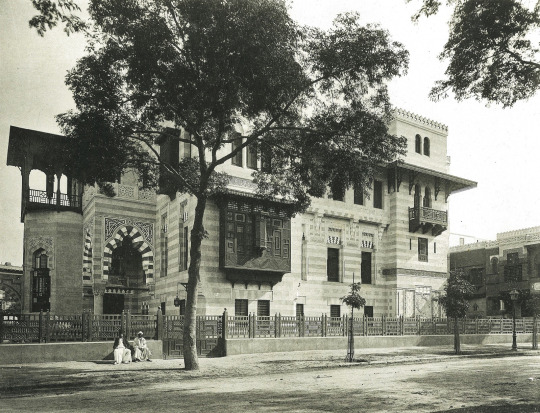
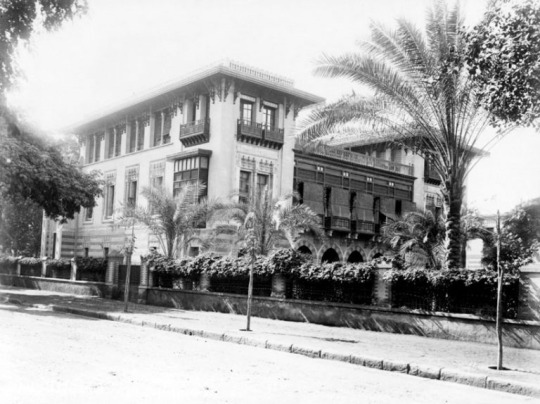
And here are some photos of Cairo in the 1800s:

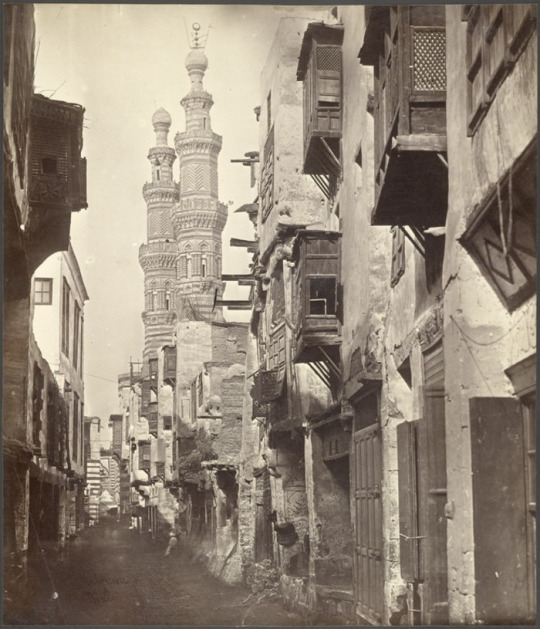
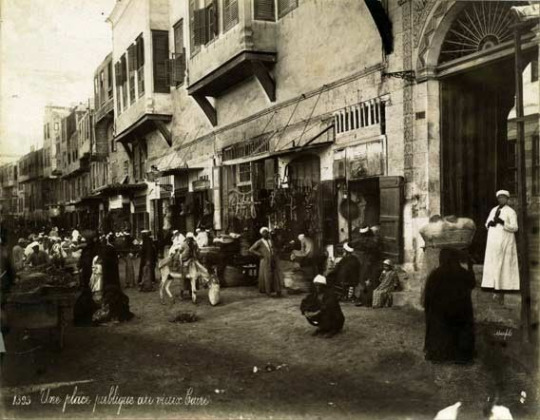
As you can see, not quite Vegas.
A fic set in Cairo can certainly still have the Cairo strip with all the casinos, since that’s an aspect of canon, but a place like that would probably be geared more to tourists and foreigners than locals. So long you’re aware of this while writing, and that Cairo would exist beyond it, you should be fine. It might also be worth having characters explore the actual city.
Weather:
The stereotype is that Egypt is just hot and sand year-round. It isn’t. The further south you go, the hotter it will get, so that Upper Egypt (which is in the south, yeah), is hotter than Lower Egypt, which is where Cairo and Alexandria are. Alexandria, by virtue of being on the Mediterranean, has fairly cold (for us) and rainy winters and mild, humid summers. Cairo gets very occasional rain and has harsher summers but is also dryer.
And, of course, a thing to remember is that even in the depths of the desert, the morning might be quite warm but the night will be quite cold as well.
Sandstorm season (called khamaseen) takes place from April - May but in the middle of Cairo it’s more of an annoyance than anything else.
Language:
Since they speak Arabic, it’s important to note that spoken Egyptian Arabic is very different from written Classical Arabic. Egyptian is a mishmash of Arabic, Coptic, a bit of Greek, and a bit of French (and, in the real world, some Turkish too) all smashed together. Accents differ from city to city, and Cairene Arabic is best known for the fact we pronounce the letter jeem as geem (so all soft Gs are turned into hard Gs) and tend to replace the letter qaf with a glottal stop.
This means that a Cairene wouldn’t be called Jamal, they’d be Gamal. A Cairene would pronounce burqa as bur’a.
Since religion plays a big part in language, RQG Egyptian Arabic may be a bit different. For instance, the greeting most people associate with Arabic is “Assalam alaykum” but that’s very specifically Muslim or at least associated with Islam, and might not have been as wide-spread given...y’know, that Islam doesn’t exist. I’m not saying it’s incorrect to use, just explaining the context.
Alternatives could include “Sabah/masa’ el-kheir” which means “Good morning/evening,” and “Naharak/Naharik saeed” which is, “May you have a good day.”
Fashion:
Although this didn’t really feature in RQG, I’ve received a lot of questions about the period’s fashion and honestly it’s my favourite thing ever so I probably would have touched on it anyway. I’ll only go into broad strokes, as there are plenty of regional variations and, again, I’m no expert
Women
Egyptian women covered their heads and sometimes their faces not out of religiosity but out of a cultural expectation of modesty. This may well have come about as a result of the Arab/Muslim cultural majority, as to my knowledge this wasn’t the case in the Greek and Roman periods, but women of all religions covered their heads so that would likely still be the case in RQG’s Arab Egypt.
This isn’t with the hijab we know today. It may have been a cloth or kerchief tied over their heads and then the melaya laf (which is larger cloth, almost a sheet) that they wrap around themselves and over their head, as follows:

The black face-covering was called a burqa or bur’a (not the same as a Muslim burqa, which serves similar modesty functions but is a separate thing) or a yashmak and may have been opaque black, white, or netted, such as in this picture:
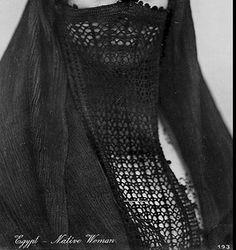
Underneath the melaya they would be wearing a long, loose, patterned dress:

Upper class Egyptian women tended to wear Western dresses with a white yashmak that covered their faces and heads. A yashmak is Turkish, however, and without Ottoman influence this style and name might not have caught on in Egypt.

Men
While the melaya laf and yashmak have disappeared from Egypt, the traditional men’s gallabeya and ammama, or turban, are still seen widely today. The gallabeya (or jellabiya, outside of Cairene Arabic) is a long, loose garment with wide sleeves and no collar. It’s in muted, neutral colours, usually lighter ones like white or beige in the summer and navy blue or grey in the winter. You’ll have seen examples of it in the pictures of Cairo above, and here’s another one:

Middle to upper class men and civil servants, however, tended to wear English suits with a tarboosh, or fez. Since fezzes were also a result of Ottoman rule, RQG Egyptians might not wear them.
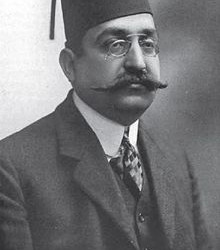
And yes, impressive moustaches were also very much the fashion.
Names:
The running joke is that Hamid’s name is unnecessarily long, but my name is longer, and I don’t think that’s particularly unusual. We don’t usually go around introducing ourselves with all of them, admittedly, and I’m not sure whether Hamid does this as a way to indicate he’s overly fancy or because Bryn doesn’t realise it, but four names is not long. My ID boasts five, and I know of at least one more.
Arabic naming conventions use patronymics for all children, regardless of gender. What this means is that my name and my brother’s name is identical except for our first.
Mine is Jasmine + Dad’s name + his dad’s name + his dad’s name + his dad’s name
And my brother is also First name + Dad’s name + his dad’s name + his dad’s name + his dad’s name.
Egyptians do not typically have last names, but an important family may all choose to identify under a name and use that as their last, such as the Tahans. In my case, I use my fifth name as my last name and introduce myself in everyday life as Jasmine Fifth Name. Notably, my brother does not, and goes by First name + Dad’s name instead. This isn’t unusual. On paperwork, however, we still have the same name.
Additionally, Egyptian women do not take their husbands’ last names in marriage, nor do children take any of her names.
I’m not sure why, according to the wiki, Hamid’s sisters seem to have taken their mother’s name. Following Arabic naming conventions, they would all be First Name Saleh Haroun al Tahan, and their father would be Saleh Haroun al Tahan. A possible workaround might be that halflings have their own naming conventions that mean daughters have matronymics and sons patronymics.
A note to podficcers: please google name pronunciations beforehand because Alex and Bryn’s are actually often wrong. Ishak, for instance, is not pronounced Ee-shak. It’s Iss-haaq or Iss-haa’, because of quirks of the Egyptian accent I mentioned earlier.
Part Two: Criticism
I understand it can be difficult to portray a country different from yours with accuracy. I understand the RQG crew will not have had the perspective on Egypt and Cairo that I do by virtue of living here. I do also acknowledge that I’m sure none of this was actively malicious or on purpose.
But it doesn’t have to be on purpose to hurt, frankly, and given how often the RQG crew have talked about their responsibility with a game that’s intended for an audience, I expected better. Bryn has spoken about not wanting to fall into stereotypes for Hamid and, to be fair, by being a non-religious fancyboy Hamid does neatly avoid the religious zealot and the noble (or ignoble) savage routes. Unfortunately, he falls into another, which was hammered home by the portrayal of Cairo and the Tahans as a whole.
Our first glimpse of Cairo, after the sandstorm clears, describes it as “basically Vegas,” with hotels and garish casinos catering to the rich all along the “Cairo strip.” From then on, our only other images of Cairo are vast estates and a pyramid in the desert.
The only named Egyptians we meet are the Tahan family, who are introduced through an absurdly lavish estate compared to the palace fortress of Alhambra, a gambling problem that apparently runs in the family, murder, and corruption, as the head of the family who has already covered up a crime for one son then turns himself in to protect the other.
Then, to top it all off, Hamid is apparently utterly incapable of understanding why letting his brother get away with murder is an issue until the paladins point it out.
Do you see the pattern, here?
I understand this was aiming to be a criticism of the rich and powerful, but the fact remains that the Tahans are the only representation of Egyptians we get. While this may not be harems and hand-chopping levels of Orientalism, the image presented is of Cairo as a den of excessive wealth and vice, and Egyptians as corrupt and immoral.
This isn’t new.
The Middle East and North Africa (as well as India and China and everywhere else considered “the Orient”) has often been tied to images of wealth and overt splendour, usually hand-in-hand with the Oriental despot and corruption. This view went beyond just fiction and influenced the policies with which we were ruled.
Cromer, Consul-General of Egypt, wrote books called Modern Egypt. He had this to say about us:
“The mind of the Oriental, on the other hand, like his picturesque streets, is eminently wanting in symmetry. His reasoning is of the most slipshod description. . . . They are often incapable of drawing the most obvious conclusions from any simple premises of which they may admit the truth.”
In his opinion, our inability to follow logical reason led to us being inherently untruthful and, therefore, immoral. Similarly, British statesman Balfour was of the belief that:
“Lord Cromer’s services during the past quarter of a century have raised Egypt from the lowest pitch of social and economic degradation until it now stands among Oriental nations, I believe, absolutely alone in its prosperity, financial and moral.”
Egypt was under British colonial rule from 1882 - 1952.
You can see, I hope, why a storyline focused on an Egyptian family’s corruption in an Egypt characterised almost entirely by its casinos and one lavish mansion was very uncomfortable. The fact Azu was one of the people trying to explain morality to Hamid keeps it from sliding into a clear East vs West dichotomy, but the fact remains this is a British show featuring British players and this is the story they chose to tell.
The rest was just salt in the wound, really.
I expect mispronounced names and pyramids and jokes about camels in most media, but rarely do the makers of said media then go on to pat themselves on the back for doing their “due diligence” on a metacast about sensitivity.
I see weird naming conventions and mispronounced names and “basically Vegas” and “crocodile steak” and “camel’s milk froyo” and I do not see due diligence.
I see a setting that barely looked past Cleopatra and I do not see due diligence.
I see a storyline that shows only excess and immorality and corruption and I do not see due diligence.
I see a disregard for me and mine, and I do not appreciate it.
Literature I’ve referred to in writing this criticism:
Orientalism (1978), by Edward W. Said
Orientalism in the Victorian Era (2017), a paper by Valerie Kennedy
Orientalism in American Cinema: Providing an Historical and Geographical Context for PostColonial Theory (2010), a thesis by Samuel Scurry
Popular Culture, Orientalism, and Edward Said (2012), an article by Robert Irwin
#rusty quill gaming#rqg#hamid saleh haroun al tahan#resource#criticism#orientalism#representation#long post
1K notes
·
View notes